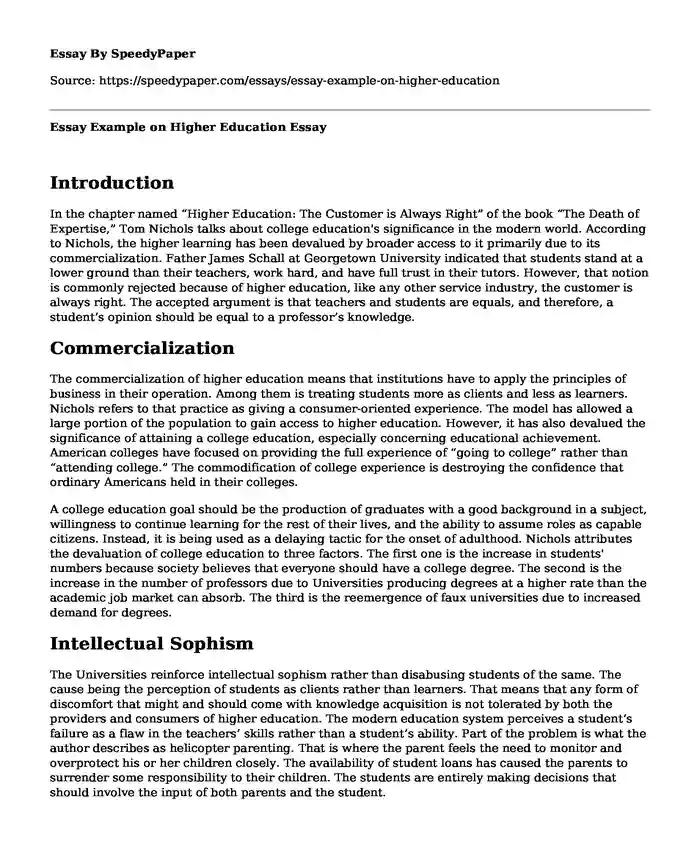Introduction
In the chapter named “Higher Education: The Customer is Always Right” of the book “The Death of Expertise,” Tom Nichols talks about college education's significance in the modern world. According to Nichols, the higher learning has been devalued by broader access to it primarily due to its commercialization. Father James Schall at Georgetown University indicated that students stand at a lower ground than their teachers, work hard, and have full trust in their tutors. However, that notion is commonly rejected because of higher education, like any other service industry, the customer is always right. The accepted argument is that teachers and students are equals, and therefore, a student’s opinion should be equal to a professor’s knowledge.
Commercialization
The commercialization of higher education means that institutions have to apply the principles of business in their operation. Among them is treating students more as clients and less as learners. Nichols refers to that practice as giving a consumer-oriented experience. The model has allowed a large portion of the population to gain access to higher education. However, it has also devalued the significance of attaining a college education, especially concerning educational achievement. American colleges have focused on providing the full experience of “going to college” rather than “attending college.” The commodification of college experience is destroying the confidence that ordinary Americans held in their colleges.
A college education goal should be the production of graduates with a good background in a subject, willingness to continue learning for the rest of their lives, and the ability to assume roles as capable citizens. Instead, it is being used as a delaying tactic for the onset of adulthood. Nichols attributes the devaluation of college education to three factors. The first one is the increase in students' numbers because society believes that everyone should have a college degree. The second is the increase in the number of professors due to Universities producing degrees at a higher rate than the academic job market can absorb. The third is the reemergence of faux universities due to increased demand for degrees.
Intellectual Sophism
The Universities reinforce intellectual sophism rather than disabusing students of the same. The cause being the perception of students as clients rather than learners. That means that any form of discomfort that might and should come with knowledge acquisition is not tolerated by both the providers and consumers of higher education. The modern education system perceives a student’s failure as a flaw in the teachers’ skills rather than a student’s ability. Part of the problem is what the author describes as helicopter parenting. That is where the parent feels the need to monitor and overprotect his or her children closely. The availability of student loans has caused the parents to surrender some responsibility to their children. The students are entirely making decisions that should involve the input of both parents and the student.
The modern system of higher education has the students instruct their professors rather than the other way round. The students have been given a false sense of achievement and overconfidence in their abilities, hence impeding their learning ability. Students take corrections as insults due to the unearning successes and praises they have received throughout their lives. These have caused them to build fragile arrogance that causes them to lash out at any person who offers an opinion contrary to their own.
Conclusion
There is also the changing technological landscape and communication channels between the students and their teachers. Technological advancements such as email have contributed to the erosion of respect towards experts and their abilities. According to Nichols, the overfamiliarity that comes with communication forms such as emails erases the distinctions between the students who ask questions and their tutors who are supposed to teach them.
Cite this page
Essay Example on Higher Education. (2024, Jan 01). Retrieved from https://speedypaper.net/essays/essay-example-on-higher-education
Request Removal
If you are the original author of this essay and no longer wish to have it published on the SpeedyPaper website, please click below to request its removal:
- Good Writing in English as an International Language - Free Essay
- Essay Example: Reflective Analysis of the Student
- Education Essay Example: Urban Design and City Planning MSc
- Essay Example: Leadership Theory and Self-Awareness (5 Marks)
- Paper Example. Dialect and Language Varieties
- Free Essay Example: The Application of Learning Theory
- Free Paper Sample on Learning Theories
Popular categories





